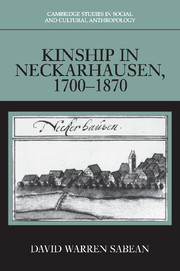Book contents
- Frontmatter
- Contents
- List of tables
- Abbreviations
- Abbreviations of sources
- On reading kinship diagrams
- Glossary
- Preface
- Introduction
- Cohort I (1700–1709)
- Cohort II (1740–1749)
- Cohort III (1780–1789)
- Cohort IV (1820–1829)
- 15 Kinship at the beginning of the nineteenth century
- 16 Kinship and practice at the turn of the century
- Cohort V (1860–1869)
- Conclusion
- Appendix
- Bibliography
- General index
- Index of villagers
16 - Kinship and practice at the turn of the century
Published online by Cambridge University Press: 04 August 2010
- Frontmatter
- Contents
- List of tables
- Abbreviations
- Abbreviations of sources
- On reading kinship diagrams
- Glossary
- Preface
- Introduction
- Cohort I (1700–1709)
- Cohort II (1740–1749)
- Cohort III (1780–1789)
- Cohort IV (1820–1829)
- 15 Kinship at the beginning of the nineteenth century
- 16 Kinship and practice at the turn of the century
- Cohort V (1860–1869)
- Conclusion
- Appendix
- Bibliography
- General index
- Index of villagers
Summary
The use of kin in a society never emanates from a single strategy, applied by all individuals. Although many generalizations about structure can be drawn from statistical correlations, it is impossible to describe a kinship system adequately without examining the logics of different occupational, wealth, political, gender, and age groups or taking into account the diversity of practices, whose creativity and reiteration continually shape, support, and reconfigure relationships between individuals and classes. This long chapter presents 13 biographies of village men who interacted with one another during the last two decades of the eighteenth century and first two decades of the nineteenth. Each of them, to use Pierre Bourdieu's image, was dealt a different hand and each maneuvered within the rules of the game with quite different resources, skill, and intensity. The biographies are based on scattered references in the sources, but the breaks, surprises, and inconsistencies would still be there if the record were fuller. The point of the exercise is to explore the range of kinship practices by steadily shifting the point of view and to link them to different strategies of class, family, and political culture.
Each biography interacts, so to speak, with the others, and reflects back on the singularity of a particular life but also adds to an unfolding story, whose focus, despite abrupt shifts in temporality and perspective, follows a line of social and political development.
- Type
- Chapter
- Information
- Kinship in Neckarhausen, 1700–1870 , pp. 293 - 360Publisher: Cambridge University PressPrint publication year: 1997



